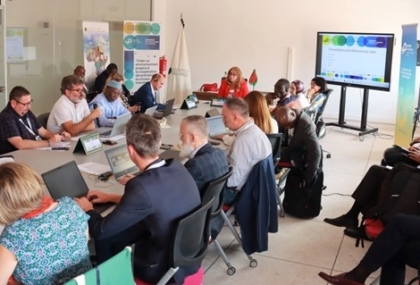
During the CIB annual meeting held in Marrakech on May 16th, 2023, the workshop on international orientation of cities served as the platform for presenting a preliminary version of the study titled 'Cities and Local Authorities' Role in International Cooperation', conducted under the sponsorship of the City Council of Barcelona and the leadership of VNG International. The study was launched with a double goal: identifying cities with a strong profile in international cooperation for global justice on the one hand and discovering different visions, modalities, and practices on the other that could enrich the CIB Working Group’s vision on the matter.
For the study, a list of ten cities was established based on specific criteria including a decentralized cooperation model, geographical balance, openness to qualitative analysis, and a departure from commonly considered cities. The selected cities are Berlin, Amman, The Hague, Vienna, Barcelona, Medellín, Bruges, Malmö, Jakarta, and Bologna.
The study aimed to explore how the cities approach international cooperation from a global justice perspective, implement technical cooperation for urban challenges and sustainable development, mobilize international aid, and advocate for human rights. Each city exchange emphasized specific aspects, introducing new topics that enriched the overall understanding of their unique models.
By conducting direct interviews with top managers in each city, the analysis delved into governance models, funding mechanisms, the historical evolution of cooperation, resource allocation, prioritized activities, ecosystem relationships, and other contextual details. The resulting observations and reflections offer valuable insights on a case-by-case basis but also helped conclude to a common ground of principles for effective cities to cities collaboration that was endorsed and enriched during the workshop in Marrakech
The bottom line learning of this study is the confirmation that each city declines international cooperation in a different way, for historical or political reasons, and that every model is subject to evolution and change over time. A growing global complexity will require more and more adaptability in the way cities face their future.
Ultimately, the successful integration of Berlin's international dimension with its local activities is vital for the city's ongoing development and global influence. By forging strong partnerships, pursuing strategic initiatives, and promoting a culture of cooperation and shared learning, Berlin can continue to position itself as a leading player in the world of international urban cooperation and contribute meaningfully to the global effort to create more sustainable, inclusive and resilient cities.
The international relationships department in Amman is newly established, having completed its scope of work and structure. To define their multi-sectorial approach, they studied international structures from around the world, focusing on diplomacy, membership in international organizations and networks, and sister city profiles. Up until 2022 the unit was a division under the communication department; as of today, it reports directly to the mayor and is currently called International Relations and Technical Support department. This means more strength and empowerment and more capacity to engage with policies and strategies.
In the early 2000s, the Medellín city's leaders recognized the need to shift the focus from its troubled past and rebrand Medellín as a forward-looking, globally connected city. They set out to establish a comprehensive strategy that would promote international cooperation and strengthen partnerships with cities and organizations from around the world. The factor that mostly defines the cooperation policy of the city of Jakarta is the legal and competential framework that derives from the national government. In Indonesia, international cooperation is based on national law, allowing cities like Jakarta to engage with other cities around the world. However, all action needs to be aligned with the National Development Plans and structured around the corresponding implementation plans at the city level.
In recent years, the city of Bologna has experienced a gradual weakening of its international positioning, particularly in European relations and networks. Despite a strong history of international cooperation and city diplomacy, Bologna is currently unable to bring a substantial amount of resources to the table but there is a clear will to activate the issue again.
The ultimate goal of this initiative is underline the importance of the city's DNA: The cities covered by this study all present such initial momentum, and it is a healthy, recommendable exercise for any other city engaging in decentralised cooperation to identify its own starting point and to reflect on the real reason for doing it, as well as the implications. The study also meant to provide interested cities with a practical approach tailored to their specific stage of international cooperation. Whether as a framework for decision-making, a self-analysis tool, or a source of inspiration for evolving existing models, the study underscores the importance of adaptability in navigating an increasingly complex global landscape.
In Marrakech, a presentation on the study was delivered by David Llistar and Jordi Cortes from the City of Barcelona, and Dr. Neila Akrimi, the chair of CIB. Following the presentation, the cities of Marrakech, Tetouan, and Durban engaged in a thoughtful reflection on the study and its key findings. Additionally, they shared three additional case studies during the session.
The main highlights of the Marrakech session was that we can see decentralised cooperation ideally as a set of inflows and outflows of capacities among cities (or regions). The nature of such capacities can be diverse: technical knowledge; process management and systems; influence over specific decision levels; funding and other resources. It is therefore critical to assess which are the capacities that need an inflow to the city in terms of technical knowledge and systems. This requires an accurate self-analysis so as to see beyond the obvious.
Furthermore we also need to mobilise the unmobilised, convince those who hesitate to engage internationally through storytelling and enhancing global responsibility.
Interested in contributing to the study or in its results, by for example presenting the case study of your city, send an email to the following email: uclg.cib@vng.nl.
